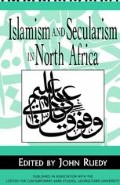Abstract
Confronted with the startlingly rapid expansion of the Algerian Islamist movement between 1989 and 1991, many Western observers of Algeria tended to perceive the movement as engaged in a revolutionary challenge to the Algerian state, and to depict the opposition between the Islamists and the nation-state as all but total. The frequent invocation of a putative analogy with Iran was merely the most conspicuous symptom and an entirely natural corollary of this general tendency to interpret events in Algeria as a clash of absolutes. As part of this reading, the religious dimension of the Algerian state was almost entirely overlooked, and the state was presented as a secularist, if not already secular, state, when in fact it has never been either of these, notwithstanding repeated Islamist denunciations of l’état impie. In effect, substantial parts of Western commentary on Algeria merely took up and amplified the distortions of Islamist propaganda on this issue.1
Access this chapter
Tax calculation will be finalised at checkout
Purchases are for personal use only
Preview
Unable to display preview. Download preview PDF.
Notes
Further evidence of this alliance appeared following the military clampdown on the FIS in the summer of 1991 with the formation of a National Committee of Support for the imprisoned FIS leaders (Comité Nationale de Soutien aux Dirigeants du FIS) on the initiative of Abdelhamid Brahimi and former Minister of Foreign Affairs Dr. Ahmad Taleb Ibrahimi (“Chronologies: 3e trimestre 1991: Algérie,” in Maghreb-Machrek, vol. 134 [October–December 1991]: 56); for the support given to the Islamist movement during the 1980s by the then Minister of Religious Affairs Abderrahmane Chibane, see Ahmad Rouadjia, Les frères et la mosquée: Enquête sur le mouvement islamiste en Algérie (Paris: Karthala, 1990), 144 et seq.
Walter Bagehot, The English Constitution, with an introduction by R.H.S. Crossman (London: Fontana/Collins, 1963), eleventh impression 1975, pp. 61 et seq.
Ernest Gellner, “The Unknown Apollo of Biskra: The Social Base of Algerian Puritanism,” in his book Muslim Society (Cambridge: Cambridge University Press, 1981), p. 156.
Jacques Fontaine, “Les élections locales algériennes du 12 juin 1990: Approche statistique et géographique,” Maghreb-Machrek, vol. 129 (July–September 1990): 124–40; Arun Kapil, “Portrait statistique des élections du 12 juin 1990: Chiffres clés pour une analyse,” Les Cahiers de l’Orient, vol. 23 (Summer 1991): 41–63.
See my article “The Politics of Algerian Socialism” in Richard Lawless and Allan Findlay, eds., North Africa: Contemporary Politics and Economic Development (London: Croom Helm, 1984), pp. 5–49.
See Rouadjia, op. cit., 147–49.
Author of Les conditions de la renaissance algérienne: Problème d’une civilisation (Paris: Éditions du Seuil, 1949); Vocation de l’Islam (Paris: Éditions du Seuil, 1954); and other works. For a discussion of Bennabi’s earlier influence, see the testimony of Rachid Benaïssa in François Burgat, L’Islamisme au Maghreb (Paris: Karthala, 1988), p. 153.
It is possible that some of the elements now engaged in armed rebellion in Algeria are animated by a root and branch opposition to the state, but it is certain that such elements are a minority, and that the Islamist guerrilla movement, which began in earnest only after the constitutionalist strategy of the FIS had come to grief with the army’s interruption of the electoral process in January 1992, would be prepared to end its armed campaign if political terms acceptable to it were offered. It should not be forgotten that, in the postcolonial Maghrib, armed rebellion has frequently been a conscious tactic in a group’s negotiation or renegotiation of its relationship to the state. See Ernest Gellner, “Patterns of Rural Rebellion in Morocco during the Early Years of Independence,” in Arabs and Berbers, Ernst Gellner and Charles Micaud, eds. (London: Duckworth, 1972), pp. 361–74, and Jeanne Favret, “Traditionalism through Ultra-modernism,” in Gellner and Micaud, op. cit., 307–24.
Editor information
Editors and Affiliations
Copyright information
© 1996 Center for Contemporary Arab Studies, Georgetown University, Washington, DC
About this chapter
Cite this chapter
Roberts, H. (1996). Doctrinaire Economics and Political Opportunism in the Strategy of Algerian Islamism. In: Ruedy, J. (eds) Islamism and Secularism in North Africa. Palgrave Macmillan, New York. https://doi.org/10.1007/978-1-349-61373-1_8
Download citation
DOI: https://doi.org/10.1007/978-1-349-61373-1_8
Publisher Name: Palgrave Macmillan, New York
Print ISBN: 978-0-312-16087-6
Online ISBN: 978-1-349-61373-1
eBook Packages: Palgrave Political & Intern. Studies CollectionPolitical Science and International Studies (R0)

